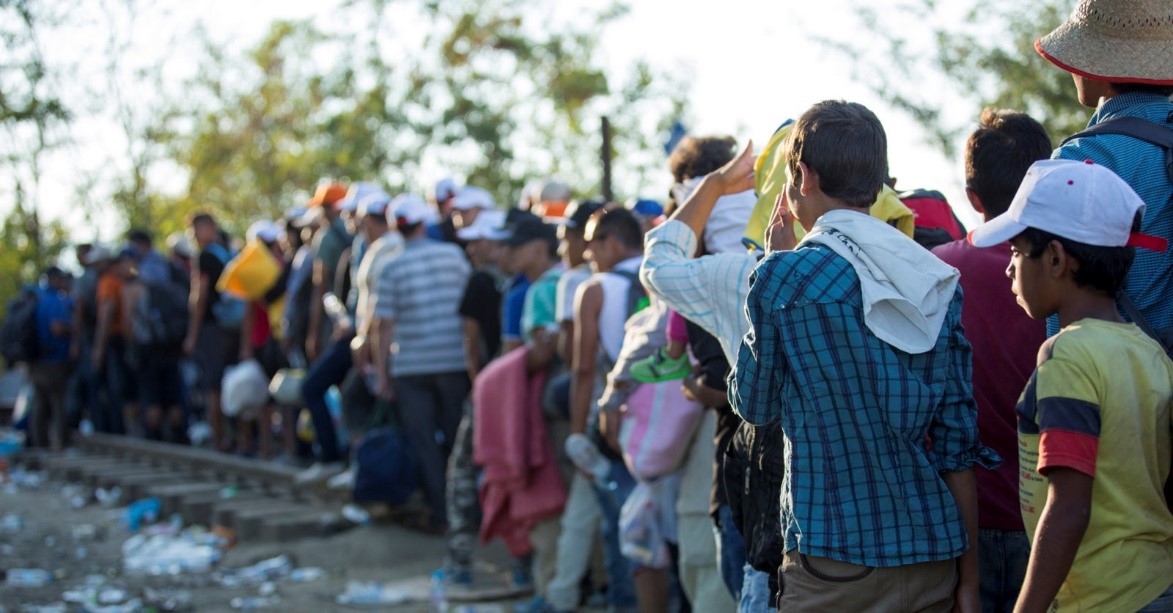|
By Jasmin Lilian Diab Source: Euro-med Human Rights Monitor Legally speaking, the words ‘refugee,’ ‘asylum seeker,’ and ‘migrant’ have three very distinct meanings and implications. Using them inter-changeably leads to hindrances to the livelihoods of each population group, the policies that govern them, and the legal frameworks they fall under. Across the world, an ongoing debate is raging about the manner through which we describe the millions of people escaping protracted conflicts in their home countries and fleeing to safer places. So are they refugees, asylum seekers or migrants? The answer to this question is pivotal – as the term used not only outlines state obligations, policies and applicable international legal instruments, but also may deny a person their internationally recognized human rights under the 1951 Refugee Convention and the 1967 Protocol. In dismissing many people on the move as “economic migrants” who are less deserving of humanitarian assistance, states have been able to shy away from their legal and human rights obligations towards some of the world’s most vulnerable groups. In 2015, widely popular news network Al-Jazeera made a trailblazing decision on the issue of terminology and wording, by announcing that it will cease using the umbrella term “migrants” when referring to the Mediterranean refugee crisis.[i] Quite fittingly, Al-Jazeera justified this move by insisting: “[…] the word migrant has become a largely inaccurate umbrella term for this complex story”.[ii] This kind of “washing” is quite commonly resorted to for words referring to controversial subject matters – particularly those with economic, social, political and legal implications. At any instance in the migratory process, there are multiple terms available to describe human movement that are pertinent to the exact migratory experience an individual undergoes – as well as the nature (forced or not) of their experience. The intentional use of one particular term over another to describe a person on the move involves a choice on the part of the speaker and carries implications about their opinions and understandings about those they are describing, and the rights they believe those being described are entitled to. As Mawuna Remarque Koutonin argues, in the lexicon of human migration, there are still “hierarchical words” created for the purpose of putting white people “above everyone else”.[iii] For instance, when people refer to “expatriates”, they are often discussing affluent people, who have moved to another country – and are often white. Defining Narratives The UN Refugee Agency defines refugees as: “[…] persons fleeing armed conflict or persecution”.[iv] According to UNHCR, as of 2020, at least 82.4 million people around the world have been forced to flee their homes.[v] Among them are nearly 26.4 million refugees, around half of whom are under 18 years of age.[vi] Refugees’ situation is often so dangerous and intolerable that they cross international borders in order to seek safety in nearby countries, and thus become internationally recognized as “refugees” and as entitled to specific protections under international law, local legal frameworks in host countries, the UNHCR, and other international UN agencies and organizations.[vii] These individuals are recognized as refugees precisely due to the fact that their lives and wellbeing is threatened if they return home. Refugees are additionally protected in international law by the: (1) 1951 Refugee Convention, its (2) 1967 Protocol,[viii] and (3) 1969 Convention Governing the Specific Aspects of Refugee Problems in Africa.[ix] Refugees are people for whom denial of asylum carries potentially life-threatening consequences.[x] Moreover, asylum seekers are individuals who claim to be a refugee, but whose claim has not been evaluated yet or processed.[xi] While not every asylum seeker will be recognized as a refugee, every refugee is initially an asylum seeker. Asylum seekers are individuals who apply for asylum on the grounds that returning to their home country would lead to their persecution on grounds of their race, religion, nationality or political beliefs.[xii] An individual is an asylum seeker for so long as their asylum application remains pending. By the end of 2019, UNHCR states that there were an estimated 4.2 million individuals around the world waiting for a decision on their asylum claims, and more than one million individuals who seek asylum annually based on the aforementioned grounds.[xiii] Due to the specificity (and implications) of each of the aforementioned definitions, placing refugees and asylum seekers under the “migrant” umbrella poses increasingly problematic realities for both groups. Migrants choose to move. They do not move because of an immediate or evident threat of persecution or threat on their lives, but rather with the aim of improving their economic standing, their education, their quality of life, or to reunite with their families.[xiv] Different from refugees and asylum seekers who are unable to return to their home countries safely, migrants face no such barrier to return nor are they at any risk if they do return.[xv] If migrants choose to return to their home countries, they will immediately continue to receive the protections and rights outlined for them by their government by mere citizenship. For individual host states, the distinction between asylum seekers, refugees and migrants is a pivotal policy concern, as states’ determination of each individual’s status on their territory outlines their obligations towards the individual in question, as well as the international legal protections this individual is afforded. The Politics of Blurring the Lines in Definition And while the definitions of asylum seeker, refugee and migrant seem clearly outlined in writing, in application, some individual cases cannot be easily categorized as one or the other – nor can their legal standing be outlined to determine the types of protection these individuals have the right to, and require. Challenges to placing an individual under a specific “category” stems from the fact that labelling an individual as an “economic migrant” or an “asylum seeker” may not always reflect the complex reality of their migratory experiences, as well as the realities that motivated them to move (for instance, this is particularly challenging for migrants that leave areas with natural disasters, drought, etc.). Furthermore, are people arriving at the shores of host countries asylum seekers or migrants? Habitat for Humanity insists they could be “a mix of both” depending on their motive for moving – regardless of whether or not they arrive in the same boat.[xvi] In order to adequately assess the category under which these individuals fall, a case by case investigation must take place into whether or not this migration was “coerced” (for migrants) and “forced” (for asylum seekers and refugees).[xvii] Moving from these complexities, state politics plays a fundamental role in shaping narratives, attitudes and outlining rights provision within their borders. Often enough, states refrain from specific categorizations in order to reduce its obligations towards particular groups, as well as to refrain from negatively impacting bilateral relations and regional political economies. When terminology such as “displaced”, “illegal immigrants”, “aliens” or “illegal arrivals” are used to refer to those seeking asylum for instance, the implications are not restricted to public sentiment – but rather are translated into policy, legal instruments, citizenship rights, and state obligations under the treaties and conventions they are party to. All this, renders the debate over the “right” term to use when it comes to cross-border movement not only controversial, but also highly political. Concluding Remarks Using the terms “refugee,” “asylum seeker,” and “migrant” interchangeably poses dire consequences for the lives and safety of millions of people on the move each and every day, and additionally take away attention from the legal protections vulnerable groups on the move require. Not only can the use of specific words impact rights, this can also undermine public support for refugees, foster anti-refugee/immigrant sentiments, and further generate public disapproval of asylum processes and the non-refoulement principle. At a time where borders are being crossed at unprecedented rates, and a time where we continue to move closer to our understanding of an international community and a shared responsibility, it is pivotal to provide an adequate legal response for some of the world’s most vulnerable populations on the move through contextualizing responses to meet their specific human rights, social, cultural, political and economic needs. Notes [i] Barry Malone (2015), Why Al Jazeera will not say Mediterranean ‘migrants’, Al-Jazeera, Retrieved at: https://www.aljazeera.com/features/2015/8/20/why-al-jazeera-will-not-say-mediterranean-migrants [ii] Ibid [iii] Mawuna Remarque Koutonin (2015), Why are white people expats when the rest of us are immigrants?, The Guardian, Retrieved at: https://www.theguardian.com/global-development-professionals-network/2015/mar/13/white-people-expats-immigrants-migration [iv] UNHCR (2016), UNHCR viewpoint: ‘Refugee’ or ‘migrant’ – Which is right?, Retrieved at: https://www.unhcr.org/news/latest/2016/7/55df0e556/unhcr-viewpoint-refugee-migrant-right.html [v] UNHCR (2020), Figures at a Glance, Retrieved at: https://www.unhcr.org/figures-at-a-glance.html [vi] Ibid [vii] Ibid [viii] European Commission (2021), Geneva Convention of 1951 and Protocol of 1967, Migration and Home Affairs, Retrieved at: https://ec.europa.eu/home-affairs/what-we-do/networks/european_migration_network/glossary_search/geneva-convention-1951-and-protocol_en [ix] UNHCR (2021), OAU Convention Governing the Specific Aspects of Refugee Problems in Africa, adopted by the Assembly of Heads of State and Government at its Sixth Ordinary Session, Addis-Ababa, 10 September 1969, Retrieved at: https://www.unhcr.org/about-us/background/45dc1a682/oau-convention-governing-specific-aspects-refugee-problems-africa-adopted.html [x] Ibid [xi] UNHCR (2021), Asylum-Seekers, Retrieved at: https://www.unhcr.org/asylum-seekers.html [xii] Ibid [xiii] Ibid [xiv] Ibid [xv] Ibid [xvi] Habitat for Humanity (2016), Refugees, Asylum Seekers & Migrants: A Crucial Difference, Retrieved at: https://www.habitatforhumanity.org.uk/blog/2016/09/refugees-asylum-seekers-migrants-crucial-difference/ [xvii] Ibid
0 Comments
Leave a Reply. |
Archives
June 2022
|
No part of this publication may be reproduced, stored in a retrieval system or transmitted in any form or by any means, electronic, mechanical, photocopying, recording or otherwise, without prior permission of the copyright holder, except for the inclusion of quotations properly cited.
Published in Vienna, Austria by ROR-n.


